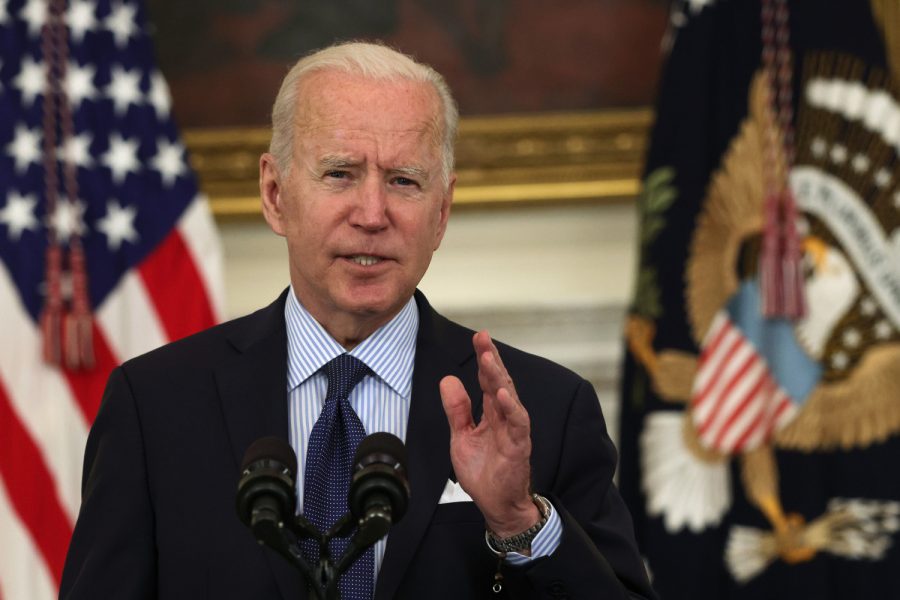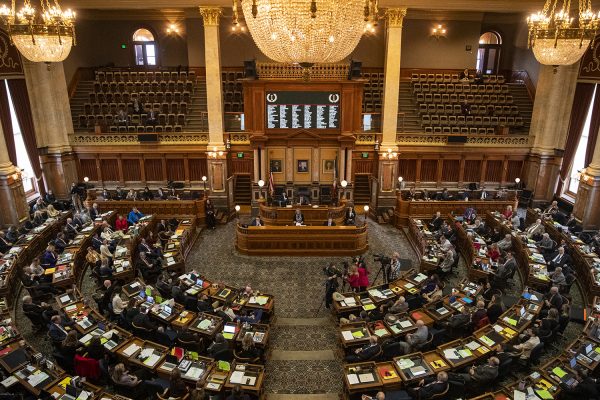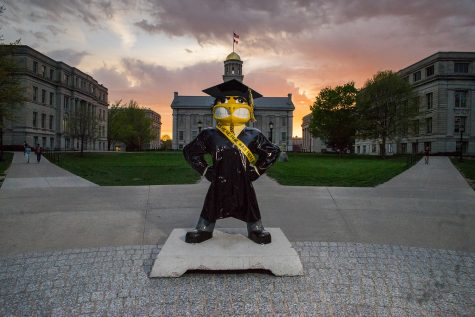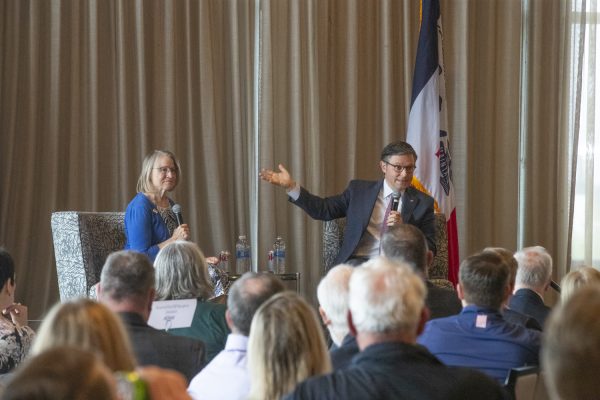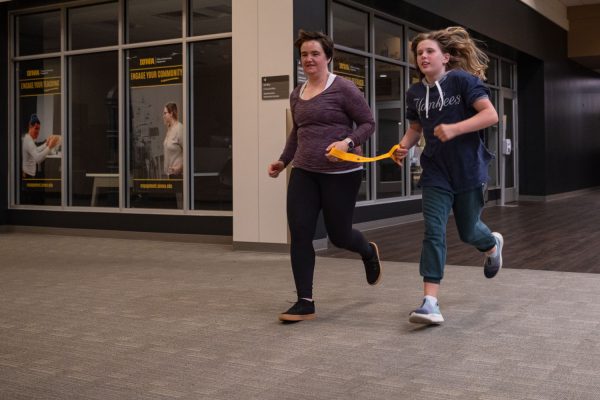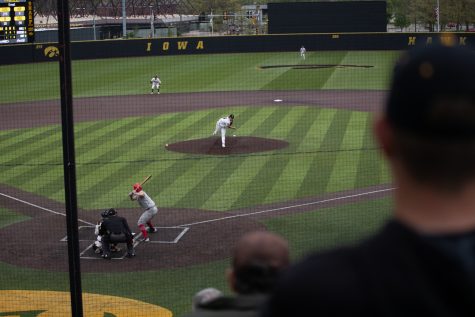Iowans hope to see infrastructure investment from Biden’s plan
A $2 trillion infrastructure plan, which could invest in Iowa’s bridges and broadband, is being held up in Congress.
U.S. President Joe Biden delivers remarks on the COVID-19 response and the vaccination program during an event at the State Dining Room of the White House on May 4, 2021, in Washington, DC. President Biden set a new goal to have 70% of adult Americans with at least one shot and at least 160 Americans fully vaccinated by July 4th, 2021.
May 11, 2021
Iowa’s infrastructure ranks among some of the worst in the nation, and funding that could help change that is being held up in Congress.
President Joe Biden’s $2 trillion American Jobs Plan would work to address infrastructure needs across the country, which includes fixing 10,000 of the worst small bridges and would “bring affordable, reliable, high-speed broadband to every American, including the more than 35 percent of rural Americans who lack access to broadband at minimally acceptable speeds.”
According to a 2021 report from the American Road and Transportation Builders Association, Iowa has some of the most structurally deficient bridges in poor condition in the country, with 4,571 bridges currently categorized as being in worse or serious condition. There are 11,200 bridges that fall into this category across the U.S.
In total, 19.1 percent of Iowa’s bridges are in poor condition.
A majority of these bridges are located in rural areas of the state, according to James Nelson, a bridge engineer at the Iowa Department of Transportation. He said that since bridges and roads in rural areas tend to be less traveled on, the state does not prioritize those areas when it comes to maintenance.
A 2019 report from the Center for American Progress found that the U.S. has an overall infrastructure grade of a D+, saying that “many smaller communities struggle to repair crumbling older facilities, pushing out businesses and creating a downward spiral of population loss and a reduced tax base.”
While the exact allocations of Biden’s plan still have to be worked out, Nelson said he expects Iowa to receive a decent amount of money to repair bridges, since the state ranks so highly in terms of poor bridges. He said that the ultimate obstacle the state is facing when it comes to prioritizing construction in rural areas, is money.
“We could repair it if we had unconstrained funding,” Nelson said. “If there are no limitations on funding, we would repair all these poor bridges, and they would bring them up into very good condition.”
The state and DOT manage a few dozen bridges, but most of the bridges in poor condition are managed at the county level, making about every one in four county bridges — about 4,000 — structurally deficient. Of those 4,000, about half of those bridges serve fewer than 35 vehicles a day, making them a lower priority for maintenance, according to Nelson.
“We’re not going to let there be a safety problem, but there could be a mobility impact problem,” Nelson said. “Meaning we would close a road or post a bridge, and then as you continue to post bridges, that hampers the traffic that can use those bridges. And a lot of those rural bridges, that might mean a farmer might have to drive further to get their grain to the grain elevator or to the market.”
The Center for American Progress calls infrastructure a “social and economic foundation” that shapes how “Americans move, communicate, and earn a living.”
Biden’s bill has received overwhelming support from Democrats in Congress, but Republicans are still negotiating details before pledging support.
Sen. Chuck Grassley, R-Iowa, one of the most senior Republicans in the Senate and a former colleague of Biden, said he opposed the bill because it’s inflated with things that are unrelated to infrastructure, such as raising capital gains and corporate taxes. The Republicans proposed spending $568 billion over five years as a counter offer to Biden’s $2 trillion proposal.
“I’m willing to work in a bipartisan way on infrastructure but am not supportive of extremely costly plans that include everything but the kitchen sink. We can address fixing and maintaining our nation’s infrastructure without breaking the bank,” Grassley said in a statement.
Iowa Democratic Party Chair Ross Willburn said in a statement that the Biden administration has made historical progress in providing people relief and helping the country to recover from the pandemic. He condemned Grassley for opposing the infrastructure plan when it could bring jobs and economic investment to underserved parts of Iowa.
“In the past 100 days, we’ve seen clearly that leadership matters. That’s why it’s so disappointing to watch Iowa Republicans, including Kim Reynolds and Chuck Grassley, choose partisanship and gridlock over what’s best for Iowa,” Wilburn said in a statement.
Expanding broadband capabilities
Biden’s infrastructure plan also lays out a path to expanding broadband connectivity. The disparity of connectivity among geographic areas and across incomes was further exacerbated by the COVID-19 as families tried to navigate online school and remote work.
According to the plan, the legislation would “bring affordable, reliable, high-speed broadband” to more than 35 percent of rural Americans who struggle with internet services. The plan goes on to say that 30 million Americans nationwide live in an area where there is no broadband infrastructure that supports minimally acceptable speeds.
Dave Duncan, CEO of Iowa Communications Alliance, has been working to bring broadband capabilities to more than 700 small communities across the state. The Iowa Communications Alliance is a nonpartisan organization that works with local service providers to bring internet and telecommunication services to rural areas. Iowa Communications Alliance does not work with service providers like Mediacom, Verizon, or other national companies.
While the organization does not financially support these providers, it acts as their advocate in the state Legislature and works to connect Iowans with a local provider.
“A big part of what we do is looking for ways to leverage state or federal funding, so that more unserved Iowans can get access to broadband,” Duncan said.
Duncan said as many people have seen and experienced, the pandemic exposed many already existing challenges that rural Iowans face when it comes to broadband — slow service, few provider options, and in some cases, people not even having a computer to search or access other services.
He also said that for people who live in sparsely populated regions of that state, it’s more difficult for local service providers to invest in those areas because there are fewer customers.
“And then on top of that, if you’re looking at certain areas to expand your broadband service, and then you find that there’s a number of customers who are economically disadvantaged, then it makes it maybe even less likely that you’re able to expand your broadband service,” Duncan said. “So that I think it gets to your point of, you know, there’s geographic issues, there’s demographic issues, and then there’s economic issues, all of which vary significantly across the state.”
Gov. Kim Reynolds signed a bill on April 28 that will award grants to companies that are working to expand broadband capabilities — a bill that Duncan has been working on with the Legislature since the pandemic set in. He was there for the bill signing, and he said it’s a good step in helping marginalized communities receive broadband.
The bill received overwhelming bipartisan support in the Legislature, but Wilburn said in a statement that federal funding for broadband projects is still crucial in helping the state leverage the investments already being made to connect rural communities.
“In addition to the passage of the American Rescue Plan, the administration has proposed historic investments to create jobs and repair Iowa’s crumbling infrastructure. The president’s American Jobs Plan will help Iowa repair aging roads and bridges, increase resiliency to protect public and private property, and make universal broadband a reality,” Wilburn said in the statement.
Biden’s American Jobs Plan is currently undergoing negotiations in the Senate, and Grassley’s office anticipates that by July, a deal will be made and Congress can start allocating the money.



